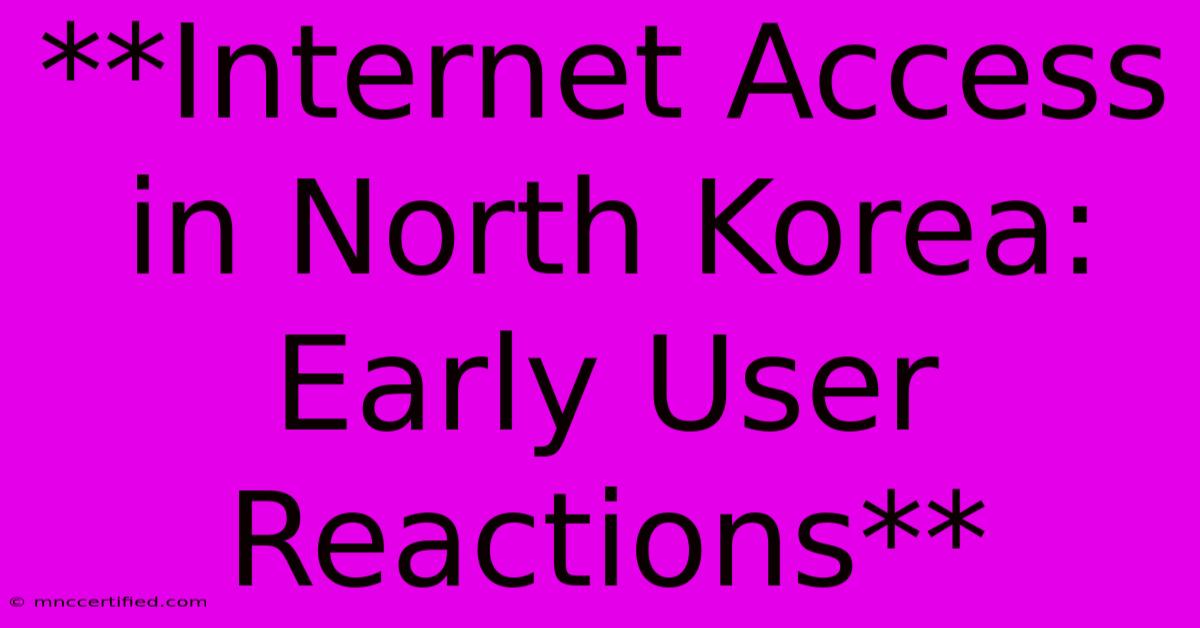**Internet Access In North Korea: Early User Reactions**

Table of Contents
Internet Access in North Korea: Early User Reactions
North Korea, long known for its strict isolationist policies, has recently taken steps toward greater internet access. While the country still maintains a heavily censored and controlled online environment, glimpses into the early user reactions offer fascinating insights into the societal impact of this change.
A Glimpse into the Digital Frontier
For decades, the internet in North Korea was primarily a tool for the elite and government officials. However, recent developments have opened the door for a select group of citizens to experience the digital world. This limited access is mainly through a government-controlled intranet known as "Kwangmyong," offering a curated selection of websites and content.
Early Reactions: A Mix of Excitement and Caution
Initial reactions to this newfound access have been mixed. Some individuals, particularly younger generations, express excitement about the potential to learn and connect with the outside world. They see the internet as a window to new information, cultural experiences, and global perspectives.
A Cautious Approach: Fear and Uncertainty
Others, however, approach the internet with caution and even fear. Years of propaganda and strict government control have instilled a deep sense of mistrust in the outside world. Many individuals fear the consequences of accessing information deemed "dangerous" by the authorities.
Limited Exposure and Controlled Information
It's crucial to understand that the North Korean internet experience is significantly different from what the rest of the world is accustomed to. Users have limited access to websites and content, with strict censorship filtering out anything deemed politically sensitive or ideologically incompatible with the regime's narrative.
Social Impact: A Shifting Landscape
The impact of internet access, even in its limited form, is already being felt within North Korean society. The potential for information sharing and the introduction of new ideas are creating a dynamic shift in the social landscape. However, it remains to be seen how the government will manage this evolving environment and what long-term effects it will have on the nation's social fabric.
Looking Ahead: The Uncertain Future of Digital Access in North Korea
The future of internet access in North Korea remains uncertain. The government's ultimate goal in opening up the internet is a point of speculation. Some believe it's a strategic move to bolster the economy and promote technological advancement, while others view it as a tool for tighter control and propaganda.
Further Observation: A Crucial Element
It's essential to continue observing the situation closely. The reactions of North Korean citizens, the evolving content available, and the government's response to the emerging digital landscape will provide valuable insight into the future direction of internet access in the country.
Conclusion: A Step Toward Digital Inclusion
The limited internet access in North Korea represents a significant step toward digital inclusion. While challenges remain, the early user reactions reveal a complex blend of excitement, caution, and fear. The ongoing development of the internet in North Korea is a story worth watching, as it promises to reveal the potential for change and the challenges of navigating a digitally connected world under a highly restrictive regime.

Thank you for visiting our website wich cover about **Internet Access In North Korea: Early User Reactions**. We hope the information provided has been useful to you. Feel free to contact us if you have any questions or need further assistance. See you next time and dont miss to bookmark.
Featured Posts
-
Experts Analyze Scholz Coalition Collapse Impact
Nov 08, 2024
-
Us Interest Rates Cut Further Reductions Likely
Nov 08, 2024
-
Ravens Thursday Night Football Channel Tonight
Nov 08, 2024
-
Second Home Vs Rental Property Insurance
Nov 08, 2024
-
Uefa Conference League Chelsea Vs Noah Live
Nov 08, 2024